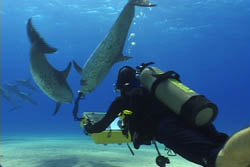Phillip J. Clapham who directs research on large whales at Alaska Fisheries Science Center reported to the Society of Marine Mammalogy in Quebec that Japanese scientific whaling is without merit and a poor screen for continuing commercial whaling.
In addition he said the Japanese consider whales competition for fish and thus want to cull them.
Scientific whaling was originally designed by the International Whaling Commission (IWC) for small sample size. Nothing like the huge takes of Japan. The IWC Protocol allows sale of whale meat to covers costs.
1982 IWC passed moratorium to start in 1986. Japan immediately began scientific whaling.
Japan says they need to kill whales to study their position in the ecosystem. But it’s really because they think whales eat too many fish – too many of “their” fish.
The total number of whales taken by all nations, including Japan, prior to the moratorium was 2100 from 1952 – 1986. Total taken by Japan since 1986 is 12,581 whales and counting. So after the moratorium the number of whales killed skyrocketed due to Japan’s so-called scientific whaling.
The original scientific whaling self-awarded quota started at 300, went to 442, then 852. Japan is now hoping to take humpbacks and has taken fins.
Japan has also taken 200 minkes in Northern Pacific.
The argument that whales “eat too many fish” is preposterous. Not all whales eat fish – most in Antarctica eat krill.
There are so few whales today compared to prewhaling that this idea of whales consuming all the fish is nonsense.
Main predation on fish is other fish.
If you remove top predators from a system you disrupt the system. The real problem is human overfishing.
Japan said Minkes were eating too much krill to allow the blues to recover. So they justified killing minkes.
Then they said the minkes were victims and that humpbacks are driving the minkes out of business. So they now want to kill humpbacks. Anything that justifies their desires.
Clapham told the meeting of nearly 1,000 marine mammal scientists that after 18 years there is no valid scientific data from Japan’s work nor has Japan integrated its work into that of other studies.
Today there are far better non-lethal alternatives to study whales.
A highly interesting turn of events is that Australia will start a Southern Ocean Research Partnership that will employ no lethal methods and will be tied in to other scientific work. What effect will this have on the Japanese Antarctic Whaling fleet operating in the same waters?
Subscribe to:
Post Comments (Atom)


1 comment:
Japan's continued and expanded program of scientific whaling is inconsistent with its obligations under the Law of the Sea convention, the International
Convention for the Regulation of Whaling Convention, the Convention on the Conservation of Antarctic Marine Living Resources (CCAMLR), and the Convention on Biological Diversity to protect and preserve the marine environment, to protect rare and fragile ecosystems and endangered species, to prepare environmental impact assessments when changes to the marine
environment are likely to be caused by its activities, and to refrain from claiming resources under the guise of marine scientific research. This
program is not legitimately "scientific" because it has not been peer-reviewed and does not have precise quantifiable goals. It is inconsistent with Japan's obligations under the Convention on Biological
Diversity because reduces the sustainability of whale species and has "adverse impacts on biological diversity." It is unquestionably an abuse of
right because it invokes Article VIII of the Whaling Convention in a manner that certainly was unanticipated by the framers of the Convention and has
been repeatedly condemned by the majority of the other contracting parties to the Convention.
Japan's actions can be challenged by concerned states in the International Court of Justice or through the dispute resolution procedures of the Law of
the Sea Convention and the conciliation procedures of the Convention on Biological
Diversity.
Post a Comment